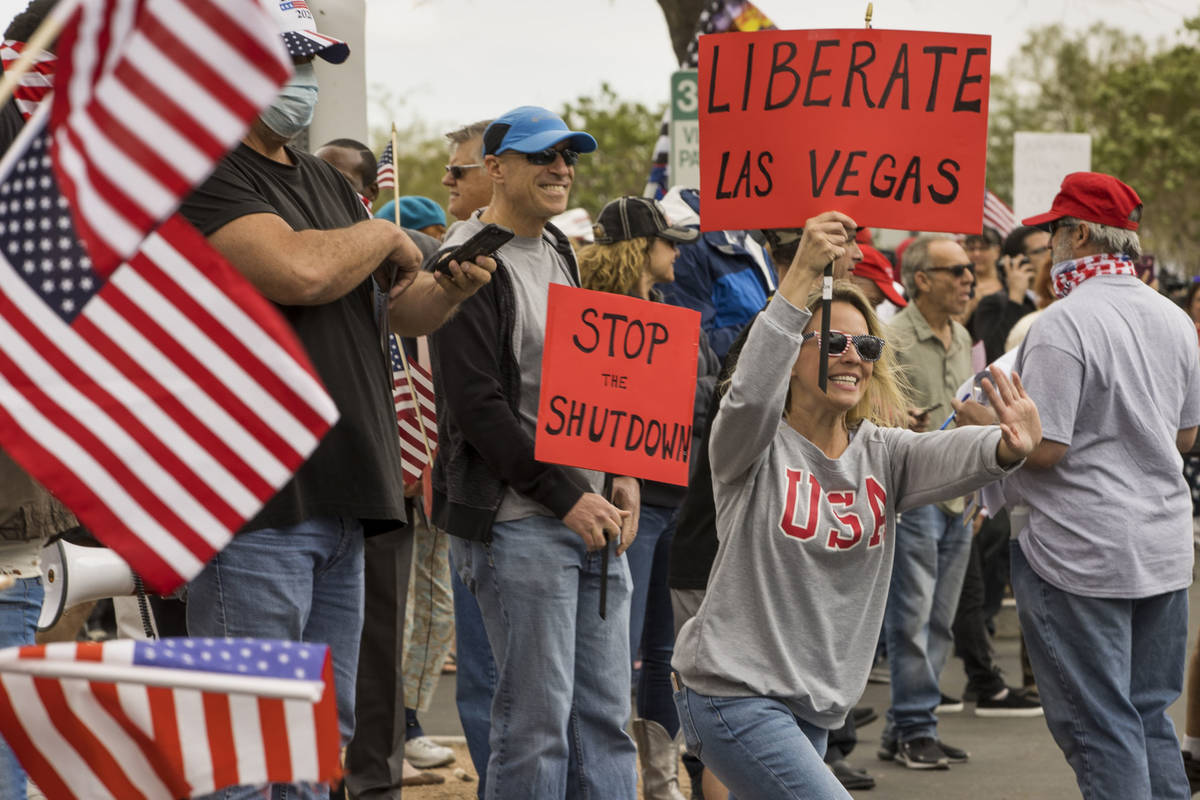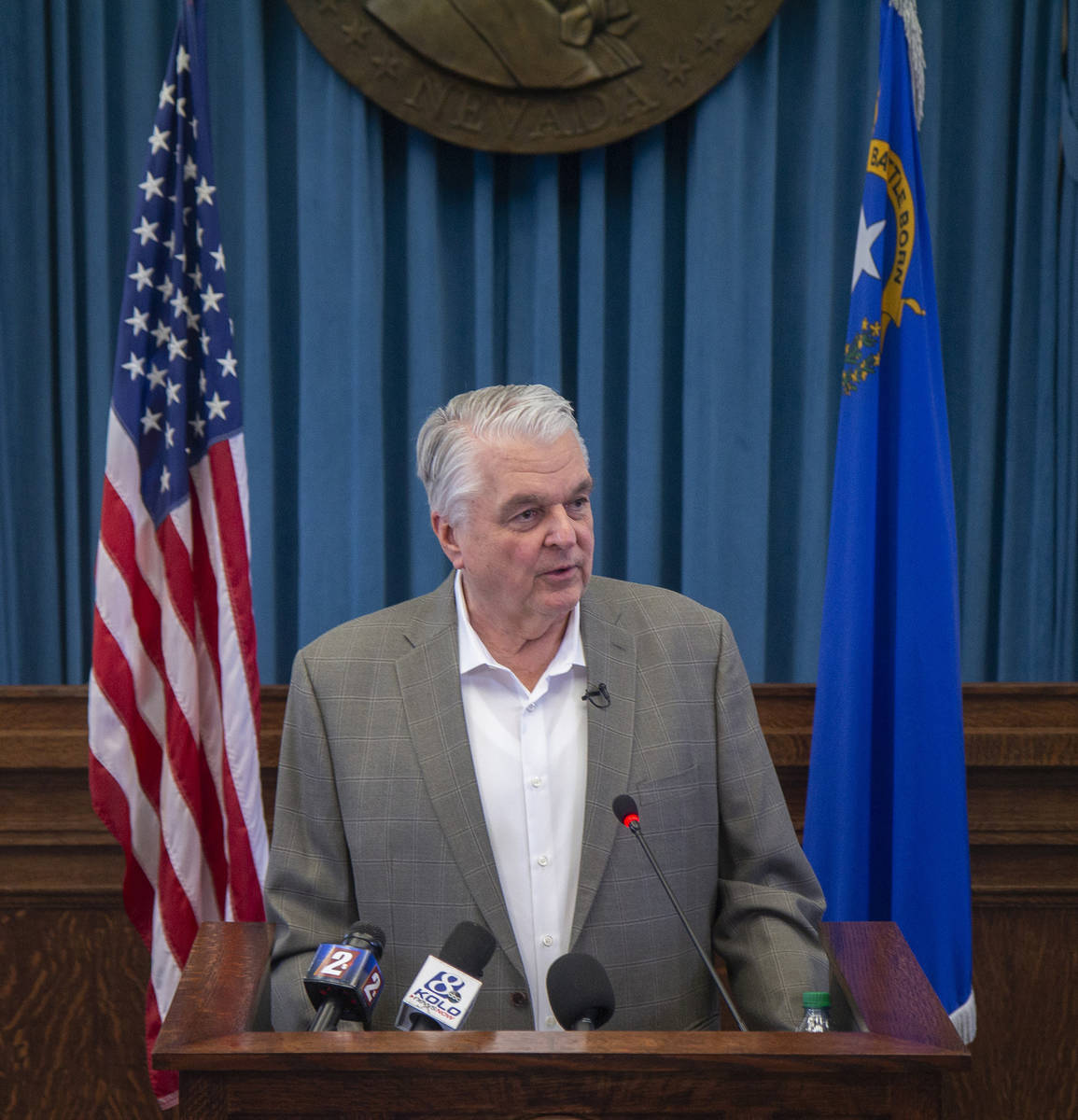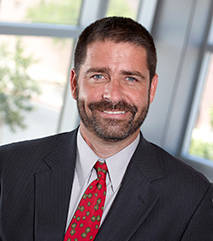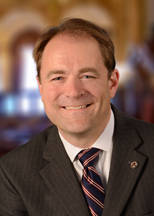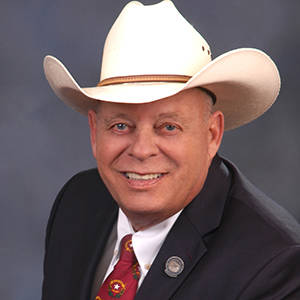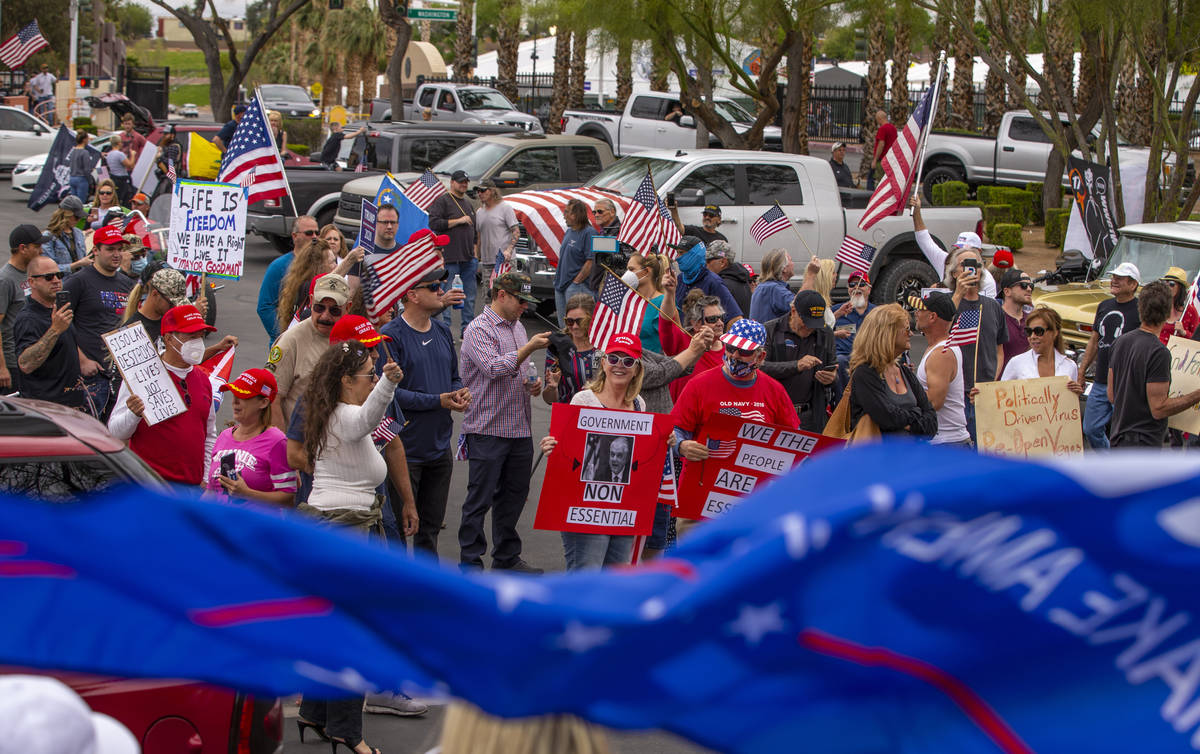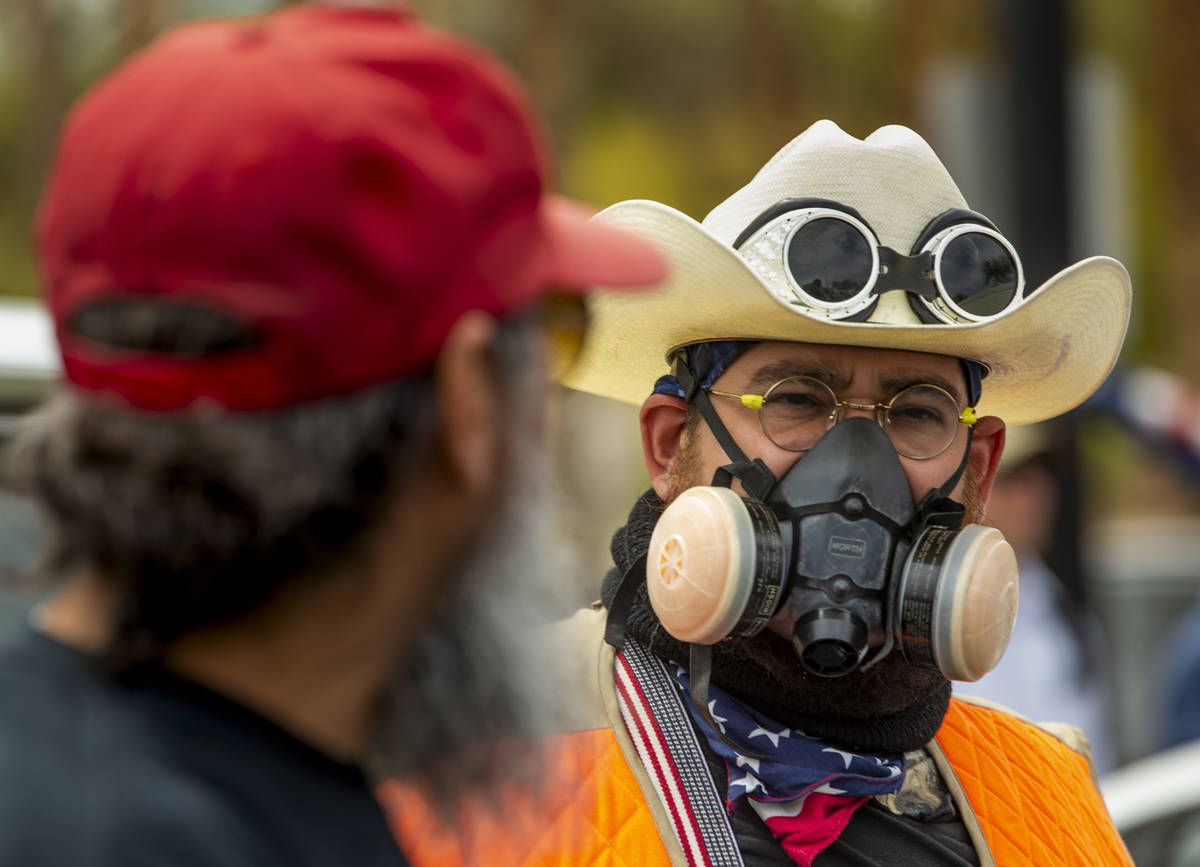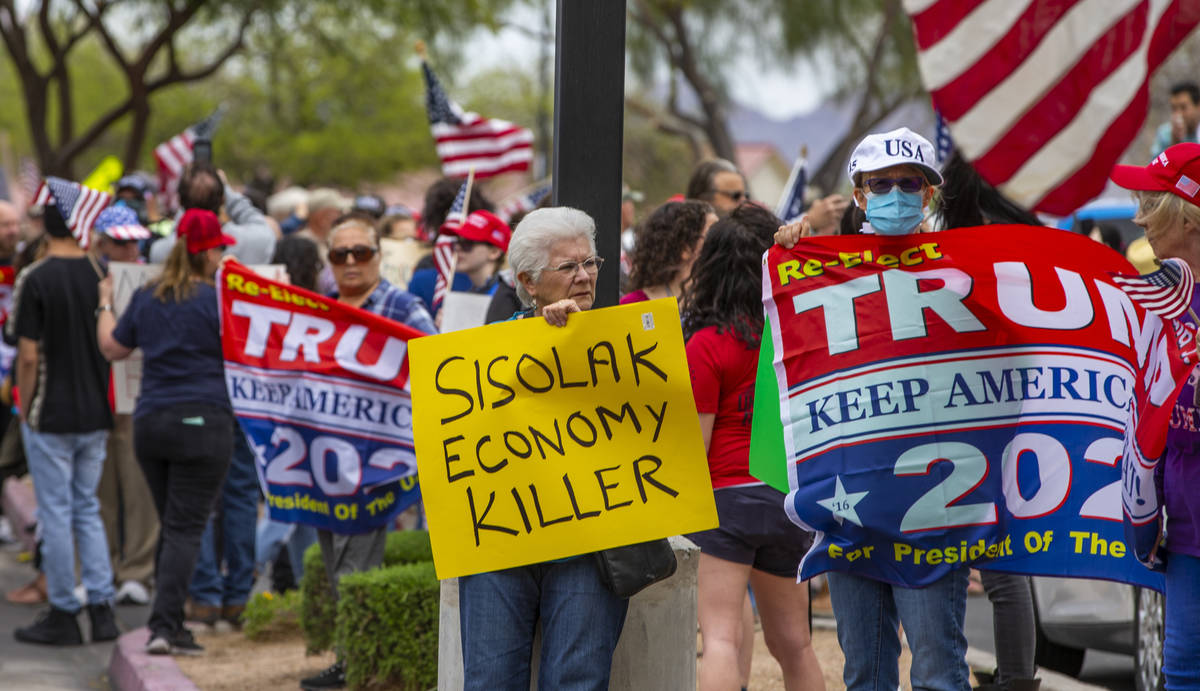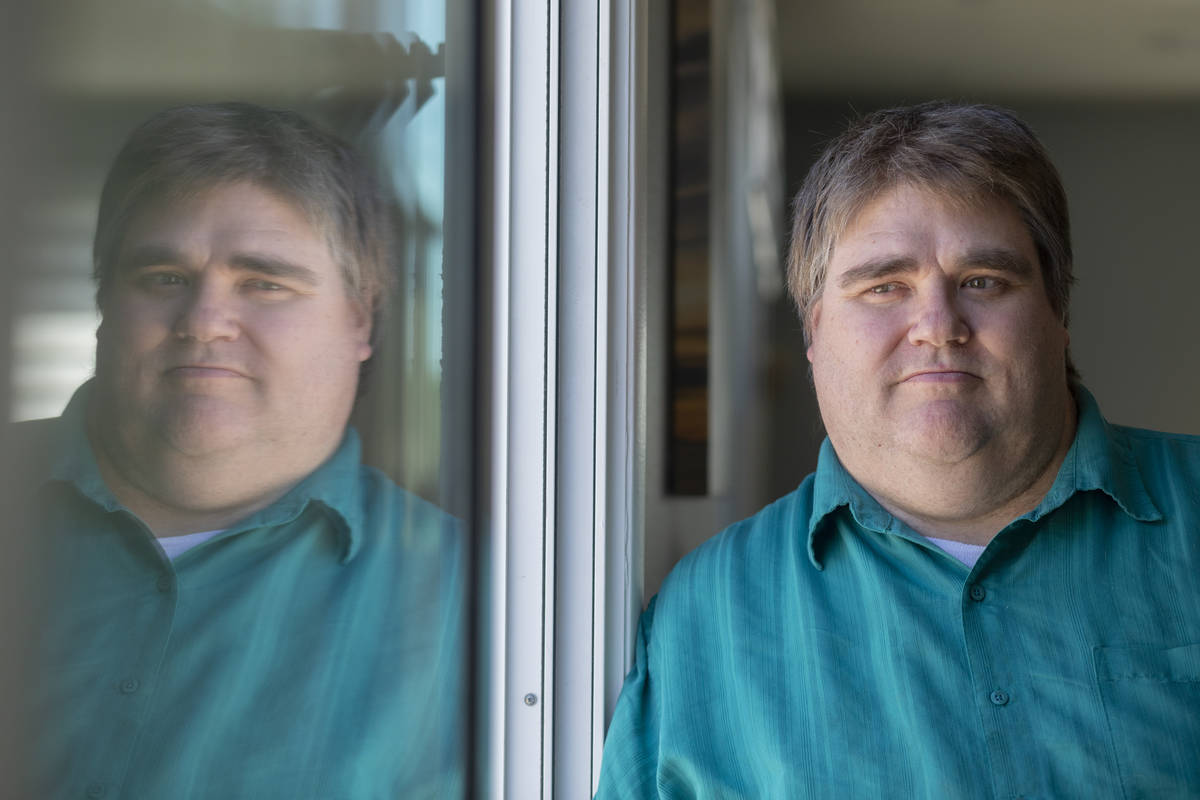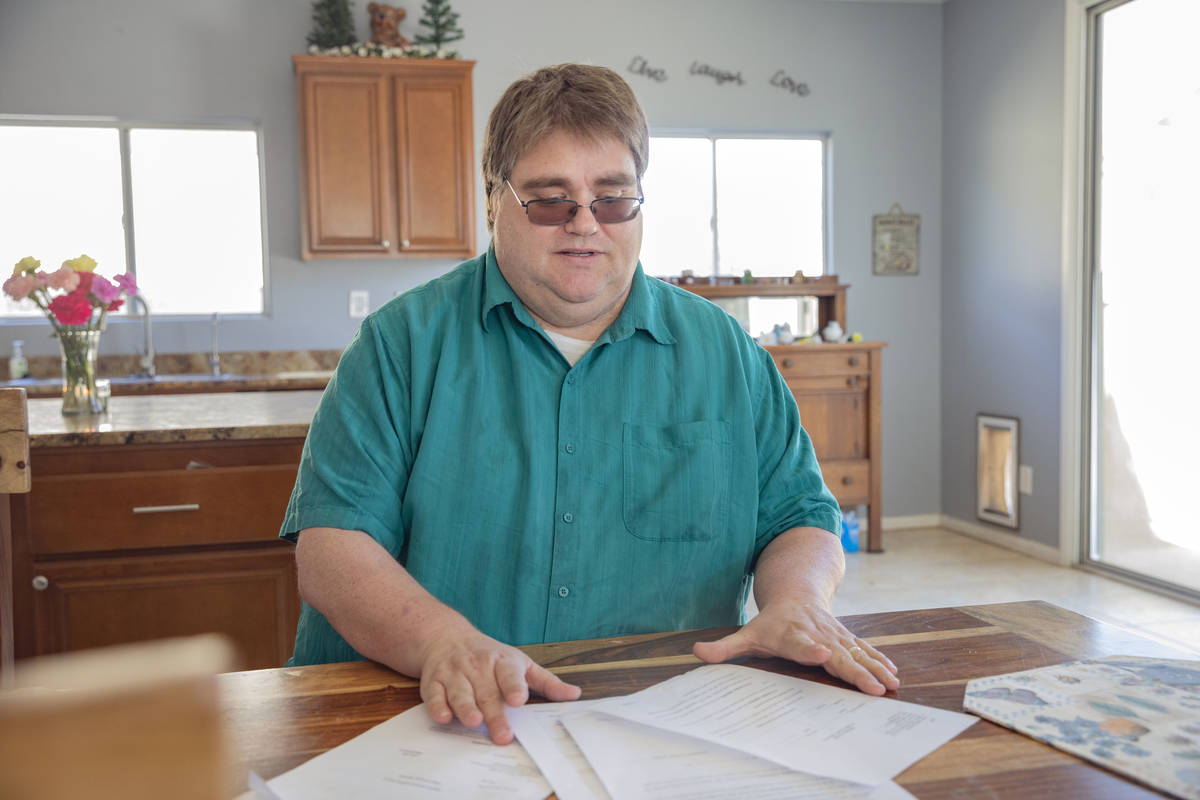Nevadans challenge governor’s power to shut down state: ‘It’s not right’
In mid-April, Sparks resident Larry Strickland started a Facebook group to demand that Gov. Steve Sisolak reverse his emergency coronavirus orders that closed nonessential businesses and required residents to stay home.
Concerned about eroding civil liberties, he expected the page would attract a hundred or so people to commiserate but was pleasantly surprised when more than 4,300 joined the Re-Open Nevada page in three weeks.
“Sisolak is trampling our Constitutional rights,” he said. “People can’t go to churches because they are closed. He’s closing camp grounds, places to go fishing. I’m not sure what … rights that violates but it’s not right.”
Across Nevada and the nation, questions are being raised about the emergency powers state governors have enacted — and the ensuing enforcement interpretations, which has led to violence, arrests and fines in some states.
New York officials are investigating an officer who allegedly beat a man during an arrest for failing to social distance, according to news reports. The Nevada Barbers’ Health and Sanitation Board fined a Reno woman for providing haircuts during the shutdown. In California, police arrested more than 30 people last week at a protest demanding the economy reopen, and a newlywed couple visiting Hawaii were taken into custody after they refused to sign a quarantine acknowledgement, stories show.
In response, legal challenges to governors’ orders are popping up around the country with plaintiffs claiming their civil liberties are being violated. A North Las Vegas man has sued, saying the emergency declaration violates his rights. Rallies demanding reopening have popped up around the state — four are planned Saturday in Nevada.
Small business leaders have slammed Sisolak for his failure to reopen quickly, with the Retail Association of Nevada releasing a survey showing the public’s approval of Sisolak’s handling of the crisis has declined.
The governor, however, has maintained the closures saved lives.
“The governor has taken necessary, proactive and informed decisions to protect the health and safety of Nevadans during this pandemic,” said a statement Sisolak’s staff issued in response to requests for an interview.
On Thursday, Sisolak announced Phase 1 reopenings would start May 9.
Michael Johnson, community health director at the Southern Nevada Health District, defended Sisolak’s handling of the coronavirus crisis on a media call Wednesday.
“The governor has taken a very strong evidence-based public health stance to this pandemic and we support that,” he said. “It’s an evidence-based informed decision, in my opinion, and not in response to protests or other political pressure.”
Broad law
Under Nevada law, the governor can declare an emergency without the consent of the legislature, remove public officials who disobey his regulations and “perform and exercise such other functions, powers and duties as are necessary to promote and secure the safety and protection of the civilian population.” Forty other states do not require the governor to get the legislature’s consent when issuing an emergency order.
UNLV associate law school dean Ian C. Bartrum, whose expertise is Constitutional law, said Nevada law was written to make sure the governor can respond to unexpected situations. But he concedes it is so broad that the governor could basically use it to justify almost any actions as long as he says those actions are designed to protect the public.
“The governor has pretty great authority and absent from reform, that authority will remain pretty broad,” he said.
Bartrum said Sisolak is in a tough position because Las Vegas attracts so many visitors that extra health safety steps are needed to protect residents.
While Nevada law allows a majority in the state legislature to overturn the executive order, Nevada lawmakers only meet every other year in regular session.
Assemblyman Jim Wheeler, a Minden Republican who was minority floor leader last legislative session, said it is unlikely Democrats will agree to a special session that limits a Democratic governor’s powers. But he expects legislation to change the emergency declaration law when the legislature reconvenes next year.
“He can basically write his own law under a declared emergency,” Wheeler said. “That’s something that has to change.”
Wheeler would like an emergency declaration limited to something like 45 days and then require the governor to get legislative consent to extend it.
Speaker of the Nevada State Assembly Jason Frierson and Senate Majority Leaders Nicole Cannizzaro, both Las Vegas Democrats, did not return calls and emails seeking comment.
State limits
Illinois State Sen. Dan McConchie, R-Lake Zurich, has introduced a law that would require his governor to get legislative signoff if he wanted to extend an emergency order past 30 days.
“The result will have the governor negotiating the parameters of the closure, providing evidence and justifying the decision making process,” said McConchie. “It will create an environment that is much more transparent.”
McConchie also wrote an opinion piece in the Wall Street Journal, arguing states around the country have few limits on the governors’ emergency powers and legislatures should step in as a check and balance. Illinois senate staff researched all 50 states, which McConchie provided to the Review-Journal, showing that in 41 states, there is little or no legislative oversight of emergency declaration.
Only Georgia and Oklahoma require the legislature to approve or extend the declaration. In Oklahoma, an emergency declaration automatically sparks a special session to consider it. Seven other states require the legislature to weigh in on extending the declaration.
Nineteen states give legislators no role in approving, limiting or overturning an executive order.
The courts are another avenue for citizens to oppose emergency declarations, but that is often is a slow and ineffective process, experts say.
In Illinois, a judge upheld a restraining order filed by one of McConchie’s colleagues but ruled it only freed that legislator — and not the general public — from the provisions of the executive orders. Another lawmaker filed a similar lawsuit asking it cover all Illinois residents.
“You are often not going to get a quick result in court if you have a governor overstepping his bounds,” McConchie added.
Nevada lawsuit
In Nevada, North Las Vegas resident Rodney Fife filed a lawsuit last week, charging that Sisolak’s emergency orders violate his constitutional rights.
Fife’s lawsuit, filed without a lawyer, claims the governor violated the First Amendment’s protections of assembly and religion and has put thousands of people out of work.
Fife, who worked part-time in marketing and sales for several companies before suffering layoffs due to the shutdown, said Sisolak has failed to protect economic interests of residents and cannot provide unemployment payments for people put out of work.
“He continues to flex his muscles so he can keep control of the state instead of giving the power back to the legislature,” said Fife, adding he has had no income for eight weeks while waiting for benefits.
While no other lawsuits have been filed in Clark County as of this week against Sisolak, residents in other states have sued to reverse governors’ closures.
Seven California businesses sued Gov. Gavin Newsom and Los Angeles officials, charging the closures that shut down small businesses violate civil liberties and damage the economy, news reports show. Maryland politicians and business owners sued the governor to lift restrictions.
The federal government is also checking for problems.
On April 27, U.S. Attorney General William Barr appointed an assistant attorney general and the U.S. attorney for the Eastern District of Michigan to monitor civil liberties abuses in states and localities.
“Many policies that would be unthinkable in regular times have become commonplace in recent weeks,” the memo said. “But the Constitution is not suspended in times of crisis.”
The U.S. Justice Department did not respond to a request for comment on any potential violations in Nevada.
Larry Strickland welcomes the federal oversight and hopes Sisolak will start listening to the protesters.
“The only thing we can do is hope Sisolak comes to his senses and there are changes in the laws that make better sense,” he said.
A previous version of the story incorrectly listed Assemblyman Jim Wheeler’s title. He resigned as minority floor leader last year.
Contact Arthur Kane at akane@reviewjournal.com. Follow @ArthurMKane on Twitter. Kane is a member of the Review-Journal’s investigative team, focusing on reporting that holds leaders and agencies accountable and exposes wrongdoing.



